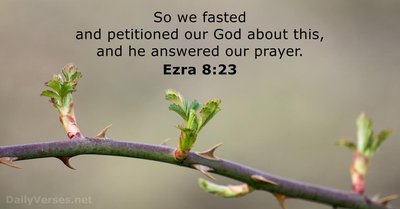Thoughts for the Day
Wednesday, 24th September 2025: Ezra - 3
Remnant Artaxerxes II Spiritual revival Covenant Ezra 9 Ezra
Reading : Verses from Ezra, Chapter 9

And at the evening sacrifice I rose from my fasting, with my garments and my mantle rent, and fell upon my knees and spread out my hands to the LORD my God, 6saying:
“O my God, I am ashamed and blush to lift my face to thee, my God, for our iniquities have risen higher than our heads, and our guilt has mounted up to the heavens. From the days of our fathers to this day we have been in great guilt; and for our iniquities we, our kings, and our priests have been given into the hand of the kings of the lands, to the sword, to captivity, to plundering, and to utter shame, as at this day. But now for a brief moment favour has been shown by the LORD our God, to leave us a remnant, and to give us a secure hold within his holy place, that our God may brighten our eyes and grant us a little reviving in our bondage. For we are bondmen; yet our God has not forsaken us in our bondage, but has extended to us his steadfast love before the kings of Persia, to grant us some reviving to set up the house of our God, to repair its ruins, and to give us protection in Judea and Jerusalem.
(Lectionary, New Revised Standard Version)
Thoughts
We have been looking at the Book of Ezra for the last two days, and only now do we meet Ezra himself. At least sixty years have passed since seeing the people returned from Babylon to Jerusalem. Ezra is a priest and a scribe, an expert in the sacred law, and is often called a Second Moses. King Artaxerxes (probably the second of this name) sends Ezra to discover the state of things in Jerusalem and we are told 'the hand of the Lord His God was upon him'. After a journey of over 1,000 miles, he and all those who have joined him arrive to discover the sad state of things. We see the city officials come to Ezra to make their confession - that the priests and Levites had married women from local pagan tribes - the sin for which they were ejected from Jerusalem all those years ago. Their faithlessness so appals Ezra that he tears his garments, pulls his hair out and sits in silence before the Lord until the time of the evening sacrifice, when he makes one of the greatest of intercessory prayers in the Bible.
It says much about him that Ezra starts his prayer by saying "I am ashamed to lift my face to Thee". He wasn't there when the events happened and they weren't his fault. He could have kept his distance and his innocence, but he calls their sin "our iniquities" and identifies himself with the national transgression. He recognises Yahweh's hand in the fact that a remnant had returned to rebuild the Temple, but in this wonderful prayer he does not ask for anything, but clearly states their guilt.
By the end of the book, Israel will have renewed their covenant with God and begun acting in obedience to Him. It was not enough for just the Temple to be restored, there needed to be a spiritual revival. Only then were the people able to renew their fellowship with their Lord. But this cycle of a faithful God who moves the hearts of people to renew His promises of restoration for His chosen people will continue, as will the people’s rejection of Him, and the terrible consequences of this for all God’s people over the centuries, then and now.
Prayer
Christian Aid - Prayer for the Middle East
God, hear our prayers for peace in the Middle East.
May all people in the region be protected, safe from harm.
We pray that this crisis will end now, with no further loss of life.
God, may the injured and distressed know your healing presence.
May the powerful and the decision-makers follow the paths of justice, mercy and peace.
We pray for recognition of the dignity and value of every life.
May the clamour of violence cease,
Replaced by the beating of swords into ploughshares.
God, in your name,
Amen.
You might like to look up information and prayers from Sabeel - a Christian-Arabic site originally founded by a Palestinian Anglican priest, Rev Naim Ateek, a former Canon of St George's Cathedral in Jerusalem. Sabeel "strives to develop a spirituality based on love, justice, peace, nonviolence, liberation and reconciliation for the different national and faith communities." In particular, the group aims to "promote a more accurate international awareness regarding the identity, presence and witness of Palestinian Christians as well as their contemporary concerns."